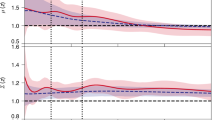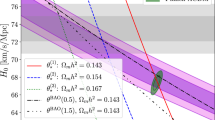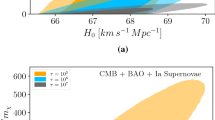Abstract
The recently proposed inflationary Universe scenario1–4 explains several of the mysteries of modern cosmology. I argue here that it also provides a natural explanation for the origin of time asymmetry (‘time's arrow’) in the Universe. The new feature which inflation injects into this long-standing problem is the temporary dominance of the cosmological term in the gravitational field equations, which acts as a sort of repulsive gravity. This term generates huge quantities of energy and radiation (or matter) entropy, while drastically reducing the entropy density of the gravitational field. It thus establishes a large gap between the radiation entropy and the gravitational entropy, which gravity is now trying to close.
This is a preview of subscription content, access via your institution
Access options
Subscribe to this journal
Receive 51 print issues and online access
$199.00 per year
only $3.90 per issue
Buy this article
- Purchase on Springer Link
- Instant access to full article PDF
Prices may be subject to local taxes which are calculated during checkout
Similar content being viewed by others
References
Guth, A. H. Phys. Rev. D23, 347 (1981).
Linde, A. D. Phys. Lett. B108, 389 (1982).
Hawking, S. W. & Moss, I. G. Phys. Lett. 110B, 35 (1982).
Albrecht, A. & Steinhardt, P. J. Phys. Rev. Lett. 48, 1220 (1982).
Davies, P. C. W. The Physics of Time Asymmetry (Surrey University Press-University of California Press, 1974).
Frautschi, S. Science 217, 593 (1982).
Davies, P. C. W. in Quantum Gravity 2: A Second Oxford Symposium (eds Isham, C. J. Penrose, R. & Sciama, D. W.) (Clarendon, Oxford, 1981).
Penrose, R. in General Relativity: An Einstein Centenary Survey (eds Hawking, S. W. & Israel, W.) (Cambridge University Press, 1979).
Barrow, J. D. Phys. Rev. Lett. 46, 963 (1981).
Bekenstein, J. D. Phys. Rev. D7, 2333 (1973).
Hawking, S. W. Commun. Math. Phys. 43, 19 (1975).
Barrow, J. D. Nature 272, 211 (1978).
Hawking, S. W. & Moss, I. G. Phys. Lett. 110B, 35 (1982).
Frieman, J. A. & Will, C. M. Astrophys. J. 259, 437 (1982).
Barrow, J. D. in Very Early Universe (eds Gibbons, G., Hawking, S. W. & Siklos, S. T. C.) (Cambridge University Press, 1983).
Gibbons, G. W. & Hawking, S. W. Phys. Rev. D15, 273 (1977).
Linde, A. D. Phys. Lett. B99, 391 (1981).
Guth, A. H. in Asymptotic Realms of Physics: A Festschrift in Honor of Francis Low (eds Guth, A. H., Huang, K. & Jaffe, R. L.) (MIT Press, 1983).
Author information
Authors and Affiliations
Rights and permissions
About this article
Cite this article
Davies, P. Inflation and time asymmetry in the Universe. Nature 301, 398–400 (1983). https://doi.org/10.1038/301398a0
Received:
Accepted:
Issue Date:
DOI: https://doi.org/10.1038/301398a0
Comments
By submitting a comment you agree to abide by our Terms and Community Guidelines. If you find something abusive or that does not comply with our terms or guidelines please flag it as inappropriate.



